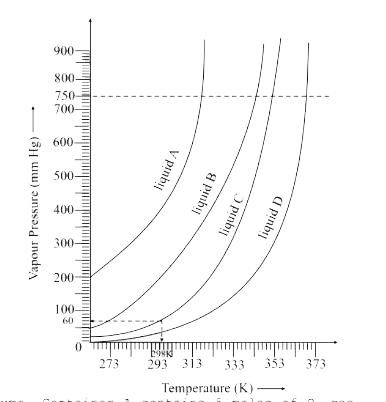Define vapour pressure of a liquid. What is the effect of temperature on the vapour pressure ?
Step-by-Step Solution
Step 1: Define Vapor Pressure
Vapor pressure is defined as the pressure exerted by the vapor in equilibrium with its liquid at a given temperature. It is a measure of the tendency of a liquid to evaporate and is an indication of the volatility of the liquid. When a liquid is placed in a closed container, some molecules will escape into the vapor phase, and the pressure exerted by these vapor molecules is known as the vapor pressure.
Step 2: Explain the Effect of Temperature on Vapor Pressure
The vapor pressure of a liquid is significantly affected by temperature. As the temperature increases, the kinetic energy of the molecules in the liquid also increases. This increase in kinetic energy causes more molecules to escape from the liquid phase into the vapor phase. Consequently, the number of vapor molecules increases, leading to an increase in vapor pressure.
In summary, with an increase in temperature, the vapor pressure of a liquid increases because more molecules have enough energy to overcome the intermolecular forces holding them in the liquid state.
Vapor pressure is defined as the pressure exerted by the vapor in equilibrium with its liquid at a given temperature. It is a measure of the tendency of a liquid to evaporate and is an indication of the volatility of the liquid. When a liquid is placed in a closed container, some molecules will escape into the vapor phase, and the pressure exerted by these vapor molecules is known as the vapor pressure.
The vapor pressure of a liquid is significantly affected by temperature. As the temperature increases, the kinetic energy of the molecules in the liquid also increases. This increase in kinetic energy causes more molecules to escape from the liquid phase into the vapor phase. Consequently, the number of vapor molecules increases, leading to an increase in vapor pressure.
Similar Questions
Knowledge Check
Vapour pressure of a liquid decreases with
Adecrease in temperatureBincrease in temperatureCincrease in surface areaDincrease in volume .
Define vapour pressure of a liquid. What happens to the vapour pressure when (a) volatile solute dissolves in the liquid and (b) the dissolved solute is non-volatile.
View SolutionWhy is the vapour pressure of liquid constant at a constant temperature ?
View SolutionThe vapour pressure of a given liquid will decrease if :
View SolutionThe vapour pressure of a given liquid will increase if
View SolutionVapour pressure of a pure liquid does not depend upon
View SolutionThe variation of vapour pressure of different liquids with temperature is shown in figure

Pressure cooker is used for cooking food at hill station. Explain in terms of vapour pressure why is it so ?
View Solution100g of liquid A (molar mass 140g mol−1) was dissolved in 1000g of liquid B (molar mass 180g mol−1). The vapour pressure of pure liquid B was found to be 500 torr. Calculate the vapour pressure of pure liquid A and its vapour pressure in the solution If the total vapour pressure of the solution is 475 torr.
View Solution
